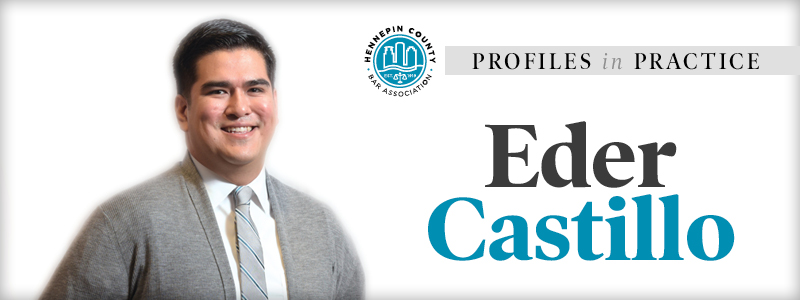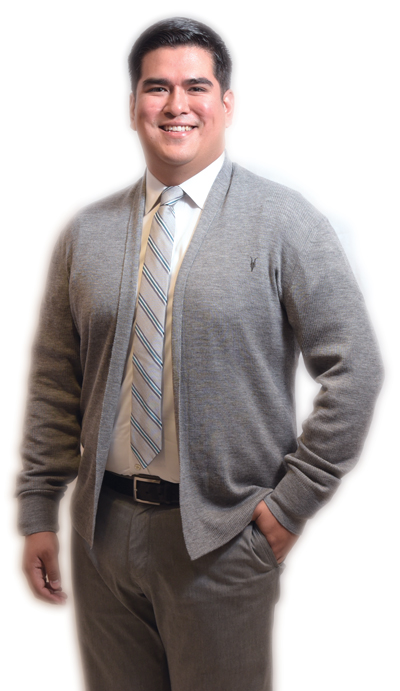
You should get to know Eder B. Castillo. In all likelihood, you’ll see his name on a ballot very soon.
“My dream is to be President of the United States,” Castillo confided during a recent interview. And with a big smile, charming affect, and thoughtful demeanor, that seems entirely plausible.
Castillo was born in Brownsville, Texas, with extended family on both sides of the U.S.–Mexico border. After following seasonal agriculture work for about a year, his parents moved to Minnesota for manufacturing jobs, and Minnesota has been his home ever since.
An only child for 13 years, Castillo grew close to his extended family in Minnesota, which included a large cadre of cousins. He recalls his childhood fondly, with birthday parties, piñatas, and riding bikes among his earliest memories. He credits his mom with instilling a deep belief in his own worth and skill during this time, reassuring him of his intelligence and ability to do anything he puts his mind to. His father, who works physically demanding jobs, has motivated Castillo’s work ethic. “If he can do it . . . then I can surely get up and work hard,” Castillo explained.
But Castillo also experienced heartache at a young age. When he was in elementary school, several members of his extended family, some of whom were as close as siblings, were deported almost overnight. “That was just such a loss for me,” Castillo said. “To lose an uncle and an aunt and to lose three cousins overnight, it . . . really shocked my system and really made me question how fair the system is.” At the time, the deportation felt entirely arbitrary to him. “They definitely weren’t criminals or anything like that, that there was a safety issue for them to be in this state or in this country.” This negative experience with the law impacted him deeply and personally, with emotional echoes to this day. Little did he know that soon not only would he be the first lawyer in his family, but also he would be arguing on behalf of an immigrant client before the 8th Circuit Court of Appeals
But law school was not on Castillo’s mind until high school, when, as he recollects, a civics teacher wrote a list of presidential candidates on the board. “He just asked a very simple question, which was, ‘How many of these people do you think are lawyers?’” The teacher then circled the majority of the names. Castillo, who long wanted to fight for the underdog, took a lesson from this. “If you want to be a leader, and you want to be equipped to lead, law school is one way to do that.” Castillo’s path was set. He quickly enrolled in every public speaking class he could and set his sights on law school.
 “If you want to be a leader, and you want to be equipped to lead, law school is one way to do that.”
“If you want to be a leader, and you want to be equipped to lead, law school is one way to do that.”
After majoring in political science and communications at the University of Minnesota, where he enthusiastically participated in mock trial, Castillo attended the University of St. Thomas School of Law. He knew he wanted to be a leader, and St. Thomas’s ethos of “leadership through service” appealed to him. Castillo quickly made a name for himself and received several accolades through St. Thomas’s Immigration Appellate Clinic, Moot Court team, and student government.
But leadership in its most honorable form is a means and not an end, and Castillo knows what he is fighting for. His aim—formerly fixed on equity for the Latino community—has grown to creating a more equitable community for all. He may not be able to change the whole world, he admits, but he can use service to improve lives in Hennepin County and Minnesota. Since graduating, Castillo has served on Chaska’s Human Rights Commission, where he helped spur his hometown toward justice for the whole community.
Castillo cut his legal teeth in criminal law, where he still practices today. He credits Hennepin County Judge William H. Koch for giving him his first legal job and his moot court coach Zuri Balmakund-Santiago for encouraging him to clerk at the Hennepin County Attorney’s Office. Now an assistant county attorney for Hennepin County, where he prosecutes complex financial crimes, Castillo regularly gives community presentations on criminal law. He feels that a well-prosecuted criminal case is achieved through fairness and empathy for both victims and the criminally accused. In his opinion, a good prosecutor really wants “a fair outcome” from the case resolution.
Indeed, Castillo’s legal philosophy is rooted in his sense of fairness. He derives morality, in large part, from his faith as a Christian. Specifically, he admires Jesus’ sacrifice for the welfare of others, which in Castillo’s opinion “was made without any sort of a pre-judgment towards others’ beliefs, behaviors, decisions . . . and so for me, I’ve got one life and I’ve got to make it count. If I’m a Christian, I’ve got to make it count for as many people as possible. For me, my way to model Christ is to model the way that he loved others.”
Castillo explains that he wants to invest his life for the betterment of others, without judgment. He admires legal practitioners who show their authenticity and humanity, recalling the time he saw Judge Koch reassure a child witness before her emotionally taxing testimony. “That was a really eye-opening moment,” he said, “that a judge would be willing to step down from the bench like that.”
A recent graduate himself, Castillo also has a message for law students of color—he has first-hand experience with “imposter syndrome.”1 He encourages law students of color to surround themselves with people who know the student’s strength and worth, to combat the pernicious self-doubt that so many feel. Indeed, being yourself is, in Castillo’s opinion, vital for success. After all, speakers and leaders are more persuasive when they are authentic.
 By Nora Huxtable
nora@arrowheadlegal.com
By Nora Huxtable
nora@arrowheadlegal.com
Nora Huxtable is an assistant public defender for the State of Minnesota and an associate at Smith Law in Grand Marais. She has a background in journalism and is a former on-air personality at Minnesota Public Radio. Her free time is mostly spent outdoors, including volunteering with Cook County Search and Rescue.
Notes
1Imposter syndrome involves feelings of self doubt, personal incompetence and a persistent, internalized fear of being discovered as a 'fraud', despite your education, experience, and accomplishments.